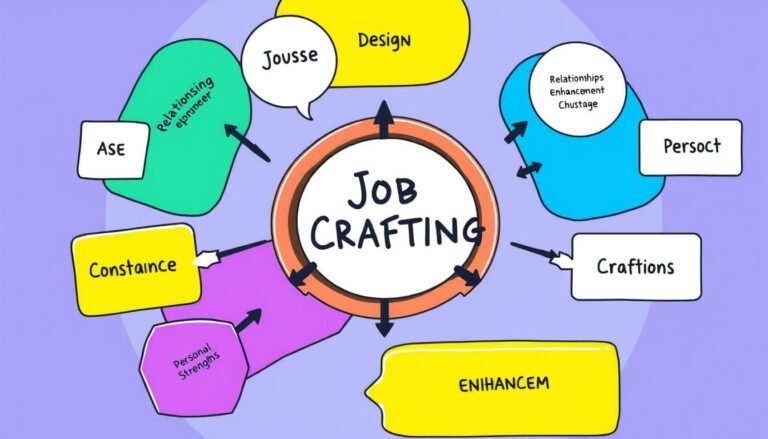How to Elevate Career Development in Your Organization Using Psychology
Are you finding it hard to keep your best employees happy and motivated? Today’s job market is changing fast, making it tough for companies to help their workers grow and stay satisfied. Psychology might hold the secret to unlocking your team’s full potential.
Career growth is key to keeping employees and making your company successful. With job happiness at a two-decade low and the Great Resignation ongoing, companies need new ways to support their staff’s career paths. Using organizational psychology, businesses can build a better work environment. This environment encourages teamwork, boosts performance, and leads to lasting success.
By applying psychological principles to your career development plans, you can see big improvements in employee engagement and job happiness. Psychology helps in attracting the best talent and creating effective training programs. It offers insights that can change how your organization grows professionally.
Key Takeaways
- Psychology is vital for improving employee performance and satisfaction
- Positive psychology boosts creativity, resilience, and engagement
- Personalized learning is crucial for successful career planning
- Investing in employees’ growth increases retention rates
- Psychological insights help attract and keep top talent
- Career assessments boost employee motivation and satisfaction
Understanding the Importance of Psychology in Career Development
Psychology is key in shaping how we work and grow in our careers. It helps make workplaces better for everyone. This leads to success and happiness for both people and companies.
The role of psychology in workplace dynamics
Psychology helps us get how people work together. It shows us how teams work, how to solve problems, and what makes a good leader. With this knowledge, companies can make their workplaces better and more productive.
How psychological insights drive employee growth
Psychology teaches us about growth mindset and self-confidence. People who believe they can learn and grow set big goals and keep going even when it’s hard. Career coaching helps find strengths and beat feelings of not being good enough.
Linking psychology to organizational success
When companies focus on mental health, they do better in many ways. They become more productive, creative, and keep their employees. Emotional smarts and being present help leaders make better choices. A positive work culture means everyone does well.
| Psychological Factor | Impact on Career Development |
|---|---|
| Growth Mindset | Encourages setting ambitious goals and learning from failures |
| Self-Efficacy | Boosts confidence in tackling career challenges |
| Emotional Intelligence | Improves communication and leadership skills |
| Mindfulness | Enhances focus and reduces work-related stress |
Using psychology in career plans makes a team strong and ready for change. This is crucial in today’s fast-paced business world.
Attracting Top Talent with Psychological Insights
In today’s job market, knowing how to attract talent is key. Companies that use psychological insights in hiring stand out. They attract the best candidates.
Understanding Candidate Motivations and Needs
Candidates want more than just money. They look for purpose, growth, and a good work-life balance. A survey showed 82% of job seekers value purpose in their work.
Companies need to show their values and culture when hiring. This helps attract the right people.
Crafting Job Descriptions that Resonate
Good job descriptions do more than list tasks. They meet candidates’ psychological needs. For example, mentioning mental health support in job ads triples interest.
Showing opportunities for skill growth can raise acceptance by 67%. This makes job descriptions more appealing.
Implementing Psychologically-Informed Recruitment Strategies
Smart companies use candidate personas to tailor their hiring. This can increase talent attraction by 50%. Highlighting work-life balance options boosts interest by 45%.
By focusing on emotional needs, companies become talent magnets. This approach attracts the best candidates.
“The best talent acquisition strategies are built on a deep understanding of human psychology. They speak to candidates’ desires for growth, purpose, and well-being.”
Using psychological insights in hiring helps companies create compelling job ads. It also leads to better recruitment strategies. This not only attracts top talent but also ensures long-term job satisfaction and retention.
Retaining Valuable Employees Through Psychological Approaches
Keeping employees is key to career management. High pay doesn’t always keep workers happy. It’s important to understand what each person needs and how they behave.
Organizational psychology helps companies understand how to keep talent. This is crucial for growth, as losing employees can be very costly.
The Society for Industrial and Organizational Psychology (SIOP) points out important trends for job happiness:
- Health and wellness initiatives
- Diversity and inclusion programs
- Flexible work arrangements
- Data-driven decision making
These trends show how important psychological methods are in managing the workforce. By focusing on these, companies can keep more employees.
“Two out of three women planning to re-enter the workforce post-pandemic expressed the intention to look for jobs offering more opportunities for skill development and personal career advancement.”
Offering career growth is key to keeping employees. A 2020 Deloitte survey found that not getting career advancement was the main reason people left their jobs. This shows the need for strong career management programs.
| Factor | Impact on Employee Retention |
|---|---|
| Training and Development | Positive direct impact |
| Work Environment | Significant influence |
| Job Satisfaction | Direct correlation |
| Transformational Leadership | Moderating role |
Using these psychological methods can make employees happier and more likely to stay. This helps the company succeed.
Leveraging Psychology to Improve Training and Development
Psychology is key in making training and development better. It helps us understand how people learn and keep information. This way, we can make learning materials more effective and keep skills sharp. Let’s see how psychology can change how we develop professionals.
Designing Psychologically Effective Learning Materials
Creating engaging learning materials is crucial for good training. Research shows that stories help us remember information better. So, using relatable stories and examples in training can make it stick.
Implementing Cognitive Strategies for Skill Retention
Keeping skills sharp is vital in training. Studies show that strong learning cultures lead to better engagement and retention. Here are some strategies to keep skills sharp:
- Encourage questions and normalize mistakes
- Foster a growth mindset
- Set clear, measurable, and achievable short-term goals
- Display the link between effort and success
Tailoring Development Programs to Individual Profiles
Customizing professional development to fit individual needs is very effective. Indeed found that tech workers value learning opportunities more than anything else. Tailoring programs to what each person needs can increase engagement and keep them around longer.
| Motivation Factor | Impact on Employee Engagement |
|---|---|
| Autonomy | Increased job satisfaction and productivity |
| Mastery | Enhanced skill development and career growth |
| Purpose | Improved commitment and job performance |
Using psychology in training and development makes learning better, keeps skills sharp, and boosts employee happiness and performance.
Career Development: Applying Psychological Principles for Growth
Career growth gets a boost when we use psychological principles. Positive psychology in career planning helps professionals reach their best. It drives them to move forward in their careers.
Upskilling works better when it matches our strengths and what motivates us. Studies show that focusing on positive feelings, being thankful, and seeing work as a calling helps a lot. It makes professional growth better.
Career counseling is changing to include mental health support. This new way helps with work stress and anxiety. It’s key for lasting career success.
“Career counseling helps individuals align their work with their values and personality through comprehensive assessments and introspective exercises.”
Deeper career planning looks into personal values and what drives us. It finds the core reasons for job happiness. This leads to lasting and rewarding careers.
| Psychological Principle | Career Development Impact |
|---|---|
| Strengths Focus | Enhanced job satisfaction |
| Positive Emotions | Improved resilience |
| Perceiving a Calling | Increased work engagement |
| Work/School Hope | Better goal achievement |
By tackling internal barriers and matching career choices with personal values, professionals can achieve more. This approach supports growth in many industries and at all career levels.
Building a Positive Work Culture with Psychological Foundations
A positive work culture is essential for keeping top talent. By focusing on psychological foundations, companies can make a place where employees flourish. Let’s look at how to build a strong work culture that promotes growth and happiness.
Creating an Environment that Fosters Psychological Safety
Psychological safety is vital for a healthy work culture. It lets employees take risks, share ideas, and work together without fear. Google’s Project Aristotle showed that psychological safety is key for productive teams.
When team members feel safe, they’re more likely to innovate and do their best work.
Implementing Positive Reinforcement Strategies
Positive reinforcement is a strong tool for shaping behavior and boosting morale. By praising and rewarding good work, companies can motivate employees and encourage desired behaviors. This approach fits with the PERMA model, which highlights positive emotions and accomplishment as important for well-being.
Developing Psychologically-Informed Leadership Practices
Leadership development is key to a positive work culture. Leaders who understand psychology can better support their teams. They can build trust, encourage open communication, and give valuable feedback.
These actions help employees feel a sense of belonging and purpose.
“A leader is one who knows the way, goes the way, and shows the way.” – John C. Maxwell
By focusing on these psychological foundations, companies can create a work culture that supports employee growth, encourages innovation, and leads to success. Remember, a positive work environment benefits both employees and the business.
Strengthening Workplace Relationships Using Psychology
Strong workplace relationships are key for smooth teamwork and better results. Psychology helps build these connections. Studies show that positive work interactions lead to higher job satisfaction and lower turnover rates.
Team building activities create shared experiences and trust. These activities boost oxytocin, reducing stress. Learning to resolve conflicts well is also crucial for healthy work relationships. By focusing on solutions, teams can face challenges together.
Empathy is a powerful tool for positive work relationships. Showing understanding in tough times creates a supportive atmosphere. This is especially important in remote work, where staying connected is vital.
“Positive relationships with others are essential for overcoming life’s challenges and finding joy.” – Martin Seligman
Showing appreciation for colleagues’ efforts strengthens bonds and boosts morale. Being active in team activities and willing to collaborate shows you’re a team player. These actions help create a positive work environment and improve productivity.
Using psychology in workplace relationships helps build a supportive and growing culture. This benefits both individuals and the company, leading to better decision-making and problem-solving.
Implementing PERMA Model for Holistic Career Development
The PERMA model, created by Martin Seligman, is a strong tool for career growth. It focuses on five key areas that help in employee wellbeing and career progress.
Understanding the five elements of PERMA
PERMA means Positive emotions, Engagement, Relationships, Meaning, and Accomplishment. Research links these to job and life satisfaction, and commitment to work. For example, feeling hopeful and grateful can make work better. Using your strengths at work makes you happier and less depressed.
Applying PERMA principles to career growth initiatives
Companies can use PERMA to make a better work place. Positive relationships among coworkers improve health and brain function. Finding meaning in work makes people happier and healthier.
Setting goals that help personal growth boosts accomplishment. This helps in career advancement.
Measuring success through the PERMA framework
The PERMA model is a detailed way to check on employee wellbeing and career growth. It’s better at predicting mental health issues than old methods. By checking each part regularly, companies can improve career development and wellbeing. This leads to a happier and more productive team.
Source Links
- Positive Psychology In The Workplace: 16 Practical Tips
- Career Growth vs. Career Development: What’s the Difference?
- 6 Career Paths in Business Psychology – Insight Digital Magazine
- Career Planning
- The Psychology of Success: How Mindset Influences Career Growth
- The Importance of Psychology in Today’s Careers
- Prioritize Mental Health in Recruitment to Attract Top Talent – Talivity
- Attracting Top Talent: The Crucial Role of a Mental Health Program
- Understanding Candidate Psychology for Better Talent Attraction – Blue Monarch Group
- Employee Retention | See How to Use Psychology
- Factors Affecting Employee’s Retention: Integration of Situational Leadership With Social Exchange Theory
- Improve Employee Retention with Career Pathing | Chronus
- Leveraging behavioural science to maximize learning engagement –
- Fostering trust, psychological safety and growth: How to leverage learning science to create a strong workplace learning culture
- Microsoft Word – v15n15.docx
- How Career Counseling Boosts Professional Growth – Therapy Group of Charlotte
- The science of happiness at work: How positive psychology can increase productivity
- Building Psychological Safety in the Workplace
- Psychological safety and the critical role of leadership development
- The Importance of Positive Relationships in the Workplace
- How to Build Positive Relationships at Work
- Build and Maintain Healthy Workplace Relationships
- The PERMA Model: Your Scientific Theory of Happiness
- PERMA+4: A Framework for Work-Related Wellbeing, Performance and Positive Organizational Psychology 2.0
- Application of the PERMA Model of Well-being in Undergraduate Students







